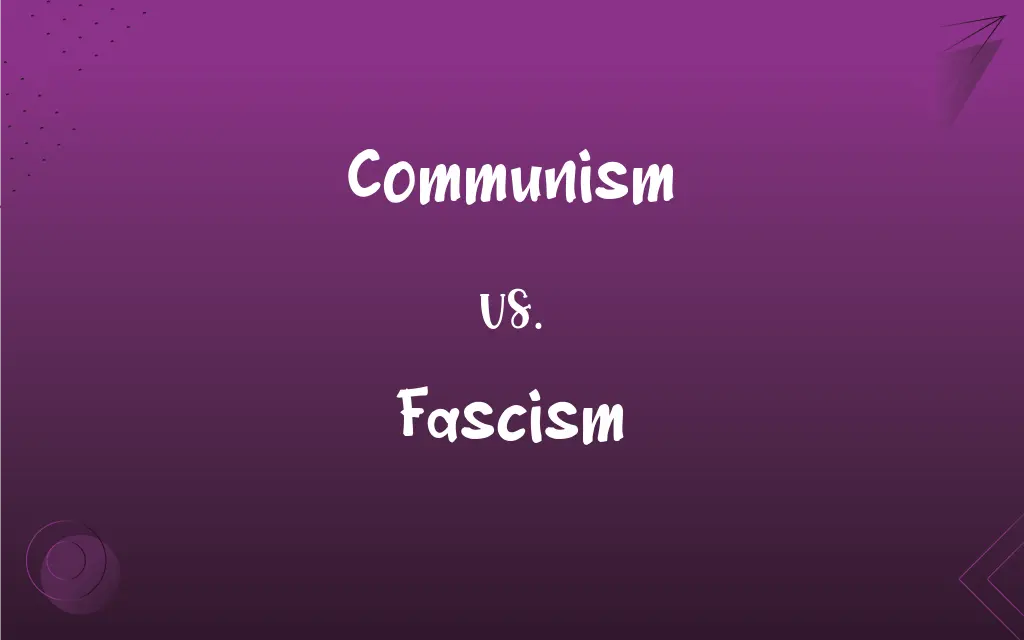Communism vs. Fascism: What's the Difference?
By Harlon Moss || Updated on October 5, 2023
Communism is political theory advocating for a society in which all property is publicly owned and each person works and is paid according to their abilities and needs. Fascism is political philosophy that exalts nation and often race above the individual

Key Differences
Communism emphasizes the collective ownership of property and the means of production. In contrast, fascism leans towards centralized control, often under a dictatorial regime, prioritizing the interests of the state over individuals. While communism often seeks to eliminate class distinctions by distributing wealth and opportunities equally among the citizens, fascism tends to preserve and exploit such distinctions for the sake of maintaining control and order in the society.
Communism often involves the eradication of private property and the abolition of the capitalist class to achieve equality among citizens. Conversely, fascism often collaborates with the capitalist class to further nationalistic goals and to maintain a firm grasp over the societal and economic structures. Communism tends to promote international solidarity and sometimes envisions a global, classless society, while fascism staunchly upholds nationalism and often employs xenophobic and isolationist policies.
The ideology of communism leans towards achieving social and economic equality through the redistribution of wealth and resources. In stark contrast, fascism generally implies a rigid social hierarchy where the state regulates both public and private life, often through repressive means. Communism, in its foundational theories, envisions a stateless society after a proletarian revolution, while fascism seeks to amplify the power of the state under a singular leader or a governing body.
Communism's economic stance is grounded in the communal ownership of production means, aiming for a distribution based on need. On the other hand, fascism, while also maintaining control over the economy, permits a level of private ownership, regulated and directed by the state, to ensure it aligns with the national interests. This divergence in economic models showcases communism’s intent to dispel socioeconomic classes and fascism’s aim to utilize them under stringent governmental control.
In terms of governance, communism seeks to eventually establish a classless, stateless society, theoretically giving power directly to the people, often through local councils or soviets. Fascism, conversely, centralizes power, idolizing a single leader who embodies the state and possesses overarching control over all aspects of life and governance. While communism purports to empower the proletariat, fascism typically suppresses dissenting voices and demands absolute loyalty to the leader and the state.
ADVERTISEMENT
Comparison Chart
Philosophical Origin
Derives from Marxist theories, emphasizing equality and classless society.
Originates from Italian Fascism, emphasizing nationalism and authoritarian rule.
Grammatical Usage
Typically used as a noun: "Communism aims at a classless society."
Generally used as a noun: "Fascism thrives on authoritarian principles."
Associated Imagery
Often symbolized by a hammer and sickle.
Frequently represented by the fasces or swastika.
Political Alignment
Typically aligned with left-wing politics due to its emphasis on equality.
Generally associated with extreme right-wing politics, emphasizing authoritarian rule.
Socioeconomic Approach
Advocates for the abolition of social classes and equal distribution of wealth.
Maintains social hierarchy and typically allows controlled private ownership.
ADVERTISEMENT
Communism and Fascism Definitions
Communism
It endeavors to abolish private ownership to prevent class struggle.
Communism posits that abolishing private property will diminish socioeconomic disparities.
Fascism
It promotes absolute allegiance to the state and often involves militaristic governance.
Fascism relies heavily on the loyalty of citizens to propagate its authoritarian rule.
Communism
Communism typically opposes capitalism, advocating for communal ownership over the production means.
Unlike capitalism, communism endeavors to distribute wealth evenly among citizens.
Fascism
Fascism leans towards an authoritarian nationalism, often sidelining individual rights.
Fascism often eclipses individual freedoms to uphold the centralized authority of the state.
Communism
The ideology advocates for the establishment of a proletarian state before achieving statelessness.
Through communism, the working class is expected to overthrow the capitalist class.
Fascism
The ideology often involves suppressing opposition and dissenting voices.
Under fascism, dissent and opposition are often met with severe consequences.
Communism
Communism is a socio-economic system that seeks a classless and stateless society.
In communism, the community collectively owns the means of production.
Fascism
Fascism may support a merger between the state and business, under the state's terms.
Fascism may manipulate economic structures to serve its nationalist and authoritarian ends.
Communism
Communism often involves a planned economy where production and distribution are regulated by a governing body.
In communism, market dynamics like pricing and production quotas are typically state-regulated.
Fascism
Fascism is a political ideology that centralizes power, often under a dictatorial leadership.
Fascism in Italy was marked by Mussolini’s dictatorial regime.
Communism
A theoretical economic system characterized by the collective ownership of property and by the organization of labor for the common advantage of all members.
Fascism
A system of government marked by centralization of authority under a dictator, a capitalist economy subject to stringent governmental controls, violent suppression of the opposition, and typically a policy of belligerent nationalism and racism.
Communism
A system of government in which the state plans and controls the economy and a single, often authoritarian party holds power, claiming to make progress toward a higher social order in which all goods are equally shared by the people.
Fascism
A political philosophy or movement based on or advocating such a system of government.
Communism
The Marxist-Leninist doctrine advocating revolution to overthrow the capitalist system and establish a dictatorship of the proletariat that will eventually evolve into a perfectly egalitarian and communal society.
Fascism
Oppressive, dictatorial control.
FAQs
How does fascism regulate its economy?
Fascism typically maintains a controlled economy, allowing some private ownership under stringent state regulation.
What is fascism fundamentally characterized by?
Fascism is characterized by authoritarian nationalism, centralized control, and often a dictatorial leadership.
How does fascism view individual rights versus state power?
Fascism often subordinates individual rights to the will and power of the state, emphasizing loyalty to the nation.
What is the basic premise of communism?
Communism seeks a classless, stateless society where property and production means are communally owned.
How does communism approach governance after the revolution?
Communism seeks to establish a proletarian dictatorship, which theoretically transitions to stateless communism.
What are some historical examples of communism?
Notable examples include the Soviet Union and the People’s Republic of China.
Which countries historically embodied fascism?
Fascism is notably associated with Mussolini’s Italy and Nazi Germany.
What is the end goal of communism as per Marxist theory?
The end goal of communism is a stateless, classless society where the proletariat controls the means of production.
Does communism allow private property?
No, communism typically abolishes private property, advocating for communal ownership.
Is nationalism a key component of fascism?
Yes, fascism strongly emphasizes nationalism, often placing the nation above individual interests.
How does communism view capitalism?
Communism fundamentally opposes capitalism due to its creation of class disparities and private ownership.
How does fascism reconcile with liberal democracy?
Fascism and liberal democracy are largely incompatible due to contrasting views on power, freedom, and governance.
How does communism view the role of the state?
Initially, communism views the state as a tool for establishing a classless society, before withering away to statelessness.
How does fascism approach dissent and opposition?
Fascism commonly suppresses dissent and opposition, often through strict regulation or force.
Can communism and capitalism coexist in one economy?
It’s complex and uncommon, as these ideologies are largely antithetical in terms of ownership and wealth distribution.
How does fascism view social hierarchy and class?
Fascism generally preserves and utilizes social hierarchy as a tool for maintaining order and control.
How does communism approach economic distribution?
Communism aims for equitable economic distribution based on communal ownership and absence of classes.
Can communism be practiced in a democratic system?
It's challenging due to inherent differences, but some systems try to merge communist principles with democratic processes.
Is fascism always associated with racism and xenophobia?
Not inherently, but historically, fascist regimes have often promoted racist and xenophobic ideologies.
What role does leadership play in fascism?
Leadership in fascism is paramount, often centralized under a single authoritarian figure or party.
About Author
Written by
Harlon MossHarlon is a seasoned quality moderator and accomplished content writer for Difference Wiki. An alumnus of the prestigious University of California, he earned his degree in Computer Science. Leveraging his academic background, Harlon brings a meticulous and informed perspective to his work, ensuring content accuracy and excellence.































































